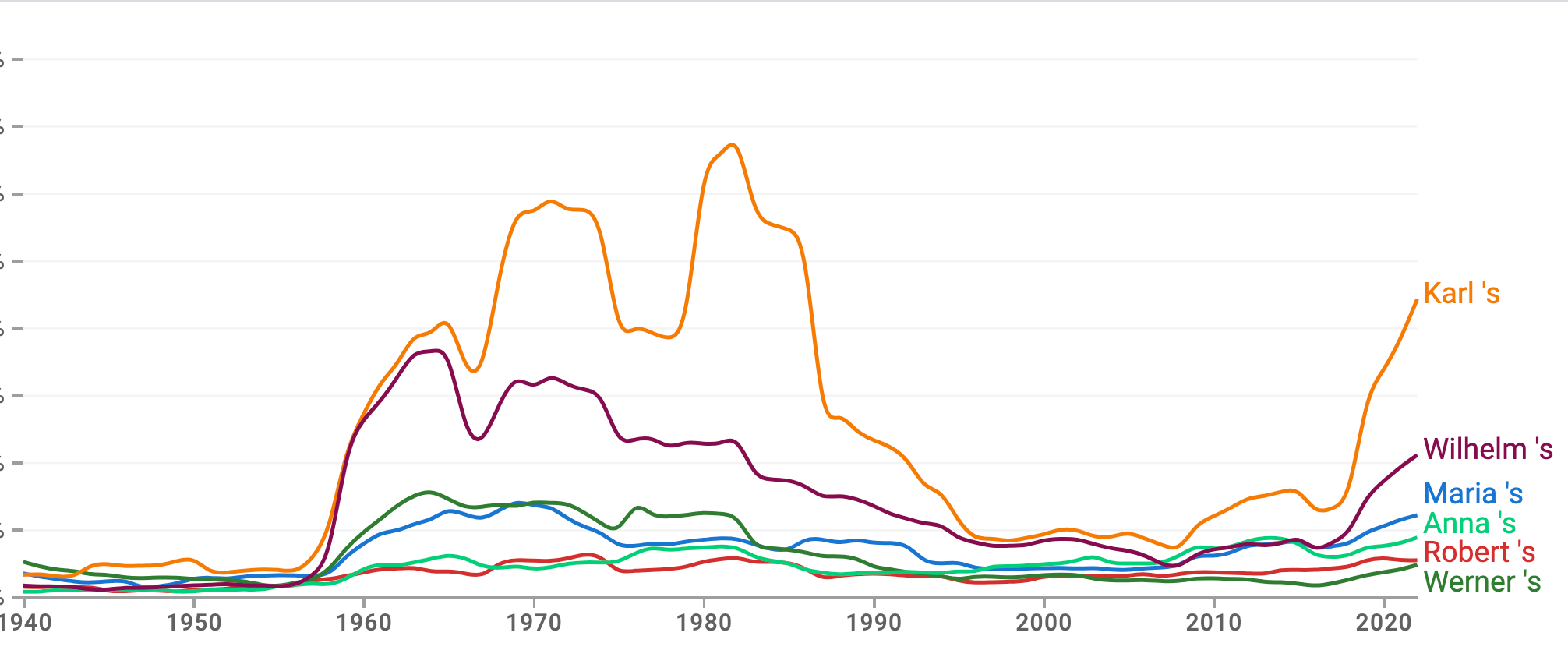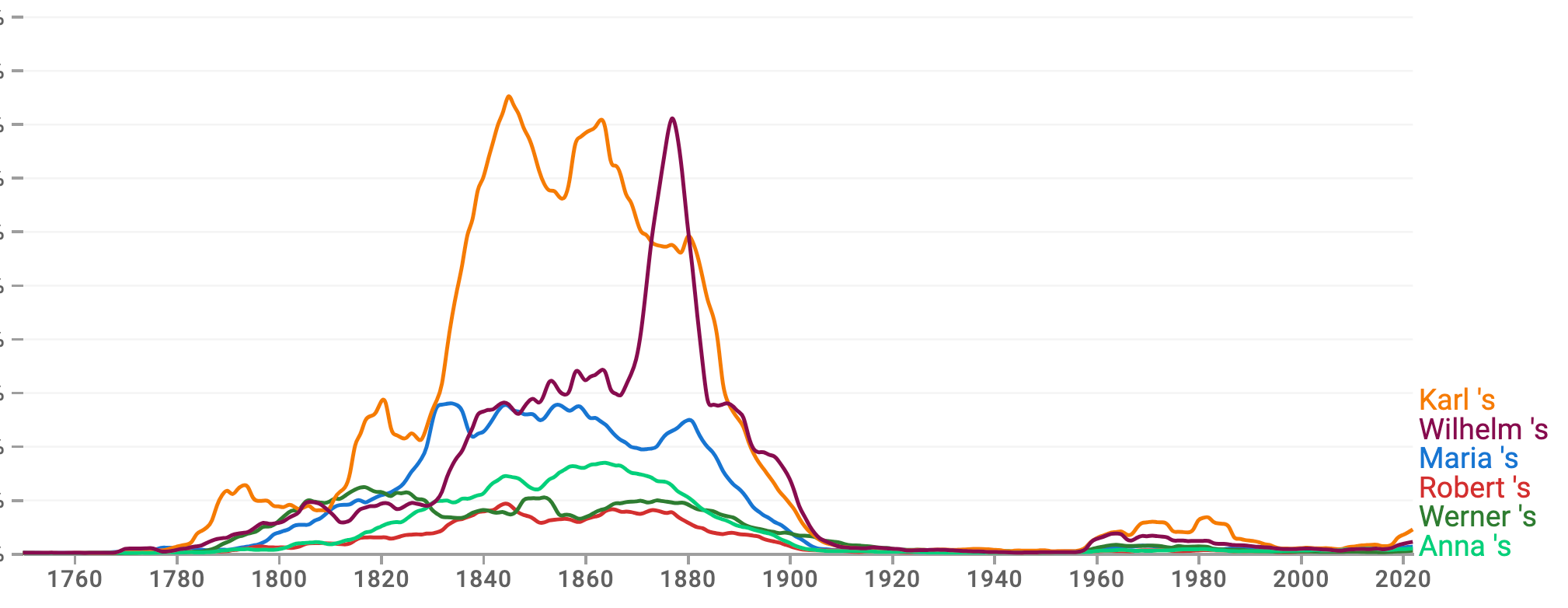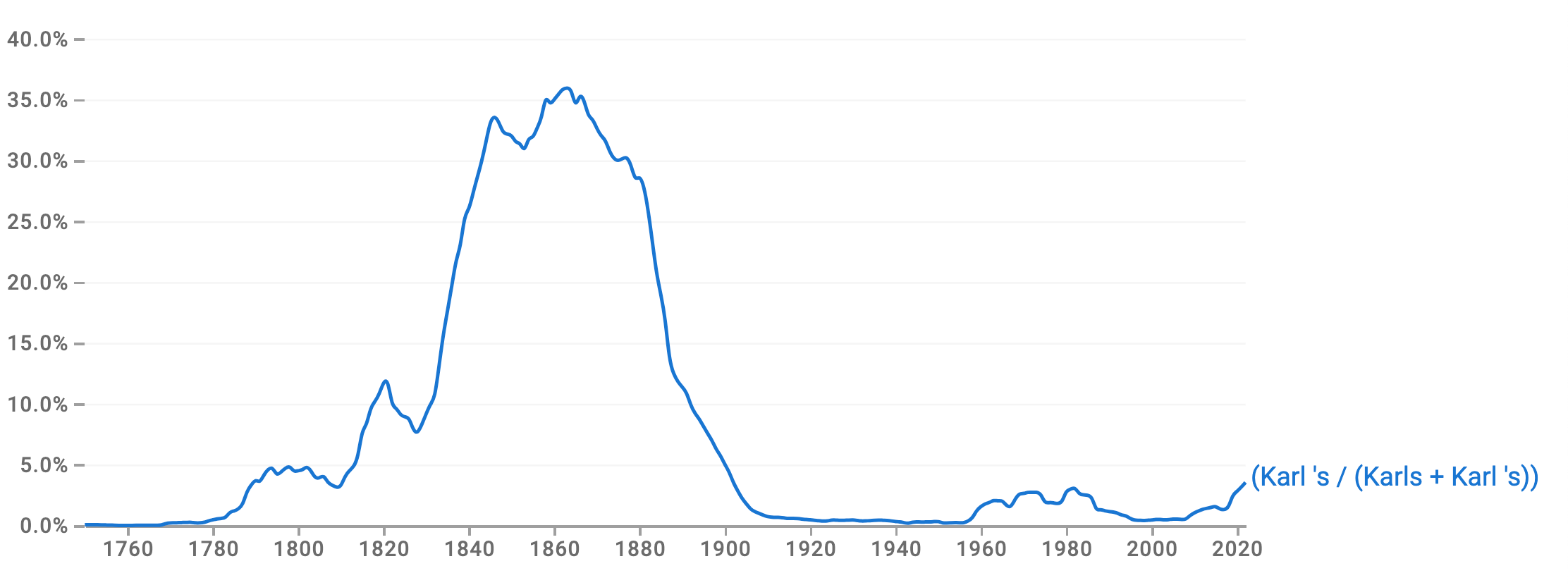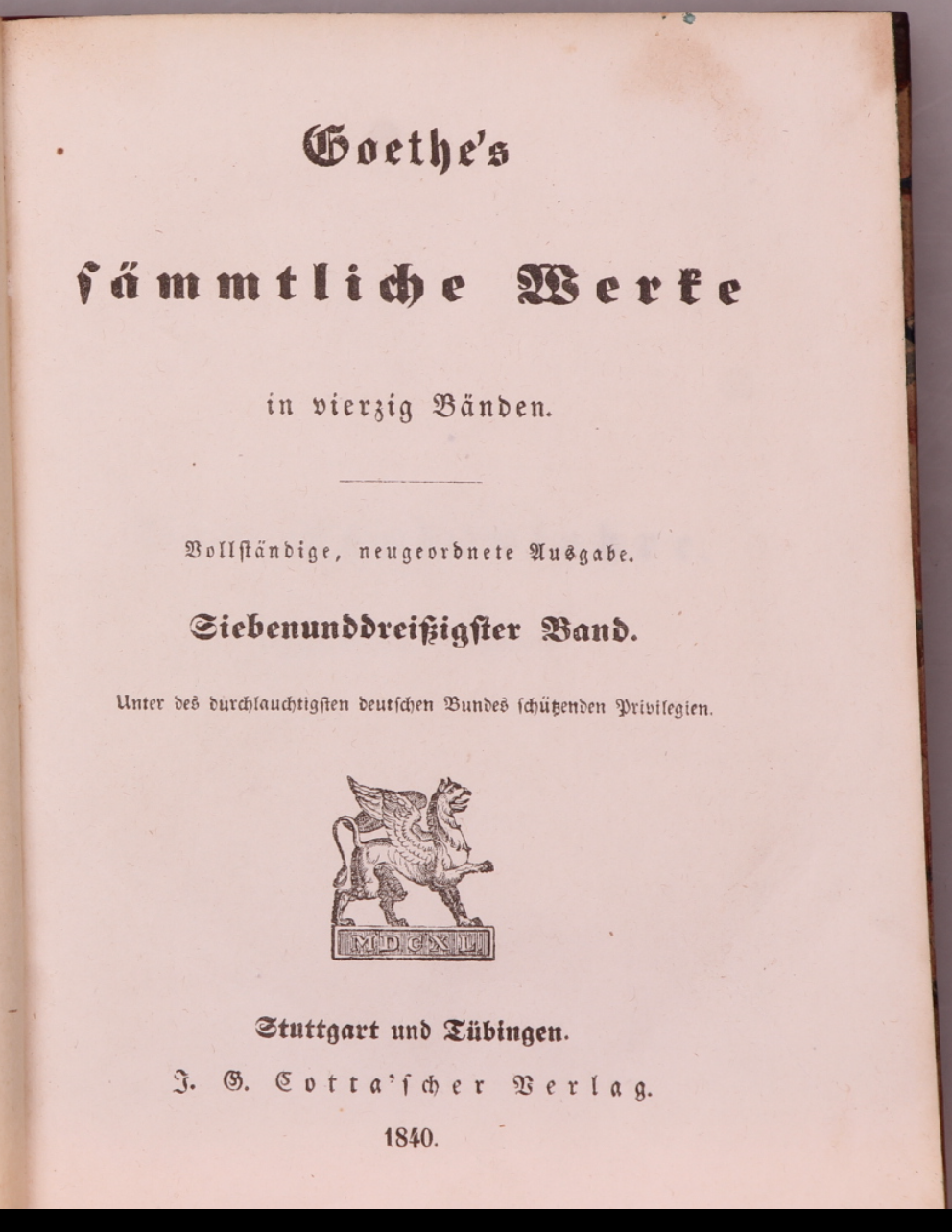"Deppenapostrophe": Is English guilty after all?
« previous post | next post »
Andreas Stolcke responds to "English is innocent" (10/10/2024):
The historical facts cited are correct, but they don't explain why the frequency of 's rose in the post-WW2 period, and again after about 2005 (= the internet), as indicated by the Google Ngrams plot below.
The bump in the post-war era (after 1957) could be an effect of the Allied occupation (delayed by the book publishing process), which was reversed by the mid-1990s, and then encouraged again by the internet half a century later.
So my bet is still on an English (language) influence.
However, it is true that use of genitive apostrophes was once much more pervasive, and dropped precipitously after around 1890, which is when Duden published his dictionary, which attained prescriptive (official) status in 1902. The mid-20th-century recovery was small in comparison to the earlier levels. All of this is nicely illustrated by Google Ngrams over the full time period:
Update — The Google Ngram Viewer's "arithmetic compositions" feature is also helpful here, allowing us to plot 's proportions over time, e.g.





WINIFER KINGSLEY SKATTEBOL said,
October 12, 2024 @ 8:27 pm
What I mourn in editing is the 's before the gerund, e.g. "It was a case of her sister's being more popular" rather than "It was a case of her sister being more popular."
AntC said,
October 12, 2024 @ 9:19 pm
Thanks Andreas, that's a great use of Ngrams.
J.W. Brewer said,
October 13, 2024 @ 5:07 am
I would think you would ideally wish to understand what motivated the initial use of the genitive apostrophe in German in earlier centuries, in terms of a perceived communicative function, whether perceived minimization of potential ambiguity or something else. Because if those motivations (and let's assume that they may be weaker than the parallel motivations in English) remained sort of latently present in the sensibility of German writers, than all you need is some cultural permission (not necessarily "officially" sanctioned) or role-modeling of the use for the use to shoot up in popularity. So it's not just English influence it's why those writing in German have been responsive to this specific influence.
Robert Coren said,
October 13, 2024 @ 9:15 am
Tangentially, I was struck by the fact that the pictured edition of Goethe's collected works is in 40 volumes. Well, I did have an idea that he was a prolific writer, but that's a lot of books.
Hans Adler said,
October 13, 2024 @ 9:30 am
@J.W. Brewer: My guess is that it has to do with the fact that just like in English, only later/slower, genitive s is transforming from a case suffix into a clitic. This makes it logical to treat it similarly to a word with some initial part contracted away.
Less abstractly, if the German genitive s were strictly a case ending, it should be used for all constituents in a conjunction: "Peters und Pauls Streit" ("Peter's and Paul's dispute"). However, in practice the genitive s is normally only attached to the last constituent as in "Peter und Pauls Streit" ("Peter and Paul' dispute"), unless you want to stress that the constituents distribute over the possessed noun phrase to: "Peters und Pauls Ansichten sind sehr verschieden." ("Peter's and Paul's opinions are very different.")
Official German orthography normally favours options that represent the structure logically. For example, while "Goethe Street" is normally written in a single word as "Goethestraße", official advice says no to do that with names consisting of separate words. "Johann Wolfgang von Goethestraße" _should_ be spelled "Johann-Wolfgang-von-Goethe-Straße", not like a bloke called "Johann Wolfgang von Goethestraße" (which unfortunately is often the official spelling). Spelling "Peter und Pauls Streit" as "Peter und Paul's Streit" similarly goes in the direction of making the orthography less misleading concerning the parse tree.
The use or non-use of apostrophes in the spelling of contractions in German is probably related. Apostrophes used to be used for this purpose about as widely as in English. I don't know if it was Konrad Duden's spelling reform or a later, perhaps unofficial one. In any case, we currently have a long list of contractions that are supposed to be spelled as single words. This makes sense because some of the most important contractions have long beome obligatory in most contexts: "im" for "in dem", "am" for "an dem" (in Austrian German also for "auf dem"). German speakers would consider it eccentric and bizarre to spell these "i'm" or "a'm". I haven't seen this even once. So it's no wonder we normally spell "ins", "ans", "aufs" (for "in das", "an das", "auf das"), not "in's", "an's", "auf's". However, rarer and purely dialectal contractions are supposed to be spelled _with_ apostrophes to make it easier to understand what is meant. As a result of this rule inconsistency, adding unnecessary apostrophes to standard contractions is just as common a phenomenon as the idiots' apostrophe. In both cases the aberration has logical motivations internal to German, but also goes in the direction of English orthography.
AntC said,
October 13, 2024 @ 9:36 am
@WINIFER [if I might so address you] What is it you mourn? IOW what is lost between your two examples? What does one convey that the other doesn't?
There might be multiple sisters; but again just not bothering with an apostrophe on the plural loses what?
Rodger C said,
October 13, 2024 @ 9:55 am
@J. W. Brewer: I've long thought that the tendency to put 's on the plural of English surnames is at least partially to avoid the impression that the s is part of the name. This must be operative in German as well ("perceived minimization of potential ambiguity" as you say). (On the other hand, another reason in English, I'm sure, is that the possessive singular form of surnames is so much more common than the plural.)
ulr said,
October 13, 2024 @ 2:55 pm
Those who use the so-called "Deppenapostroph" have never read 17th- or 19th-century German authors in the original spelling (editions of German classics are usually heavily modernized, even substituting a form like "zween" (in Hölderlin) with "zwei"; don't believe editors who claim the modernisation was "behutsam"). In fact they are people who probably do not read very much at all. In spoken German, the usual form of the genitive is not -s, but von. Nobody says "Peter(s) und Pauls Streit" in everyday German, it's "der Streit von Peter und Paul" or (in this case) "der Streit zwischen Peter und Paul". When I went to school in the 1960s/70s, we were still told to avoid these forms in writing because they were considered to be vulgar ("ungebildet") and clumsy. My impression is that they have become much more common in the intervening decades. Still, "-s" is a marker of written, educated German – a style the users of the "Deppenapostroph" are not really familiar with, but they remember another thing from school – the English genitive in "-'s", and they confound the two forms, which I don't find unnatural at all.
But my prediction for German usage is that the genitive in "-s" will die out in the coming decades (much like Hölderlin's "zween").
Bob Ladd said,
October 13, 2024 @ 2:56 pm
I'm surprised no one has mentioned Dutch in this context. Like German and English, it has both a genitive -s and a plural -s, and in most cases, as in German, you're not supposed to separate it from the stem with an apostrophe, but (as in the new ruling on German) there are certain cases where the apostrophe is used, notionally to prevent orthographic ambiguity. The most conspicuous cases for an English reader are foreign words ending in certain vowel letters, like camera and auto, which are pluralized as camera's and auto's. This looks a lot like the English "grocer's apostrophe", but it's motivated by the fact that the pronunciation of vowel letters in Dutch is conditioned by syllable structure, so autos without the apostrophe would have a short O instead of a long O.
Google doesn't have a Dutch corpus for n-grams yet, so I have no idea if the unsanctioned use of apostrophes has increased with the influence of English, or if Dutch has an equivalent expression to the German Deppenapostroph. But the parallels in the three big West Germanic languages are striking.
David Marjanović said,
October 13, 2024 @ 4:15 pm
What surprises me about the sudden increase in Karl's and Wilhelm's around 2015 is that nobody bears these names anymore. Who is it that's being put in the genitive here?
Tangentially, I was struck by the fact that the pictured edition of Goethe's collected works is in 40 volumes. Well, I did have an idea that he was a prolific writer, but that's a lot of books.
Poems, plays (Faust is extremely long, and there are many others), novels, philosophical writings (including a lot on philosophy of nature, i.e. attempts to do optics and geology by just thinking about them), and you might get to 40 volumes even without including his private letters.
I'm a 42-year-old native speaker and have never encountered this before.* How widespread is it?
It is true that multi-part names get the -s only at the very end: George Herbert Walker Bushs Amtszeit – very much unlike, say, Slavic languages or Latin. But I've never seen this extended to two separate names. (Or even to Karls des Großen, where the noun, the article and the adjective all retain their separate genitive marking.)
* I do mean in writing. In speaking the genitive is a niche product much as ulr said.
Only in Vienna – though the Viennese don't know they're being misunderstood by the rest of the country.
ulr said,
October 13, 2024 @ 4:54 pm
As for the 40 volumes of Goethe: those volumes were smaller than modern books; for example, "Dichtung und Wahrheit", one (text) volume in modern editions, was published in three volumes (24-26).
Mark Liberman said,
October 14, 2024 @ 5:14 am
@David Marjanović: "What surprises me about the sudden increase in Karl's and Wilhelm's around 2015 is that nobody bears these names anymore. Who is it that's being put in the genitive here?":
A scan of today's news.google.de turns up Karl Lauterbach, Karl Obermeyr, Karl-Heinz Bodtmann, Karl Acshenbrenner, and others.
But anyhow, the texts in the Google Books corpus are not necessarily about people in the world at the time of publication, as a Google Books search shows.
/df said,
October 14, 2024 @ 6:13 pm
As @Bob Ladd documents for Dutch, so for French, at least in Belgium. I remember noting this in 1990s Brussels, in a multinational organisation. Here's a current web page for a vendor of "pin's", ie lapel badges: Nos pin’s se portent facilement sur une veste, …. Presumably the apostrophe is needed so that it doesn't rhyme with the plural of "fin".
David Marjanović said,
October 15, 2024 @ 9:20 am
Oops, sorry, the paragraph beginning with "Tangential" is a quote.
Bybo said,
October 15, 2024 @ 4:18 pm
So you, too, fell for this forgery …
Later biographers, embarrassed by the young Goethe's career as a plumber and heating installer, documented in his work Aus meinem Leben. Dichtheit und Wartung in which he reflected on this humble early episode of his long and diverse career, conspired to hide this mundane aspect of their great national idol and came up with the fake autobiography so slyly retitled.
Philip Taylor said,
October 19, 2024 @ 5:58 am
Just received an English Deppenapostroph in an e-mail from DHL — "You're next notification options updated successfully". Sigh.